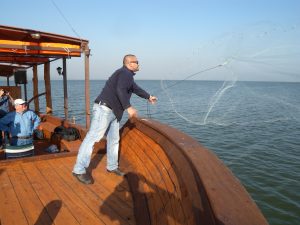HOMILY WEEK 22 04 – Year II
An Invasion of Grace
(1 Cor 3:18-23; Ps 24; Lk 5:1-11)
*************************************
Did you know that all wise people come from the East? And that the wiser they are, sooner they come!
The liturgy today encourages us to be wise, put our faith in Jesus, receive his forgiveness, put out into the deep, and follow him.
 The gospel begins by telling us the crowd was pressing in on Jesus standing by the lake to “hear the word of God.” That is an indication that a theophany is about to take place, an experience of God, an invasion of grace. Then Jesus chooses to teach the crowds from Peter’s boat – a hint at the primacy of Peter. Actually, that location by the Sea of Galilee is Tagba, known as the Primacy of Peter.
The gospel begins by telling us the crowd was pressing in on Jesus standing by the lake to “hear the word of God.” That is an indication that a theophany is about to take place, an experience of God, an invasion of grace. Then Jesus chooses to teach the crowds from Peter’s boat – a hint at the primacy of Peter. Actually, that location by the Sea of Galilee is Tagba, known as the Primacy of Peter.
We then observe the emptiness of human effort alone. Peter and his companions had fished with nets all night long and caught nothing. I have had that experience, fishing for trout on Lac La Plonge for three hours, complete with out-riggers and a depth-finder on which we could see schools of fish, yet without a bite. We were fishing with hooks. Peter and his companions were fishing with nets. There were no fish in that part of the lake.
Jesus then again singles out Peter with the command to let down their nets for a catch. Bishop Robert Barron offers his insights into this whole scene: “Jesus climbs into Peter’s boat without asking permission. He simply commandeers this vessel that is central to the fisherman’s life and commences to give orders. This represents something of enormous moment: the invasion of grace.
Though God respects our relative independence, he is not the least bit content to leave us in a “natural” state. Instead, he wants to live in us, to become the Lord of our lives, moving into our minds, wills, bodies, imaginations, nerves, and bones.
This commandeering of nature by grace does not involve the compromising of nature but rather its perfection and elevation. When Jesus moves into the house of the soul, the powers of the soul are heightened and properly directed; when Jesus commands the boat of the natural human life, that life is preserved, strengthened, and given a new orientation.
This is signalled symbolically by the Lord’s directive to put out into the deep water. On our own, we can know and will within a very narrow range, seeking those goods and truths that appear within the horizon of our natural consciousness, but when grace invades us, we are enticed into far deeper waters.
To his credit, Peter is humble and obedient, puts out the nets, and a miraculous catch of countless fish occurs. Peter recognized that here was someone who exercised divine power. Suddenly aware that he was in God’s presence, Peter fell to the ground before Jesus acknowledging his sin. The stronger the sun, the more distinctly we see our shadow.
We too may come to a similar point of recognizing God’s holiness and our own sinfulness and unworthiness. Some of us have an unfortunate tendency to dwell on our sins. Guilt, shame, contempt for ourselves – any number of painful emotions flow in like a tide. If only they could flow out as quickly.
But notice Jesus’ response to Peter. He didn’t directly answer Peter’s confession. Rather, he moved past it and told Peter of the great new role he had in mind for him. To Peter’s cry of remorse – “Depart from me, Lord, for I am a sinful man!” – Jesus answered with a reassuring promise: “Do not be afraid, from now on you will be catching people” (Lk 5:8,10).
This is how God looks at us: not as sinners mired in offences, but as servants called to carry out important work. God knows our sins. But when we repent and come to Jesus for forgiveness, we are immediately flooded with his mercy and forgiveness – and just as quickly called to move on to the business of building up his kingdom. In a sense, we have no need or right to dwell on sins that God has removed, and even forgotten. I recall one eighty-year old man who confessed again a sin he had committed forty years earlier. He was relieved to hear that God did not even remember his sin, so why was he still carrying it?
God’s mercy has no limits. God delights in showing God’s kindness. If God did not withhold his love and mercy from us before we loved him, will God refuse us now? Of course not! So, we must press on in serving the Lord, confident that his mercy is greater than our sins.
This is the wisdom, as opposed to knowledge, that St. Paul refers to in the first reading, in which he reminds us that wisdom far exceeds knowledge, to the point where those who are wise can even dare to be fools for Christ’s sake, as they let go of any over-attachment to knowledge in the pursuit of the prize of wisdom.
The Eucharist is an act of faith in Jesus, who wants to come into the boats of our lives, grant us forgiveness and healing, and calls us to follow him.
So, let us have faith, let his mercy invade our lives, put out into the deep and follow him in building up the kingdom of God here on earth.



